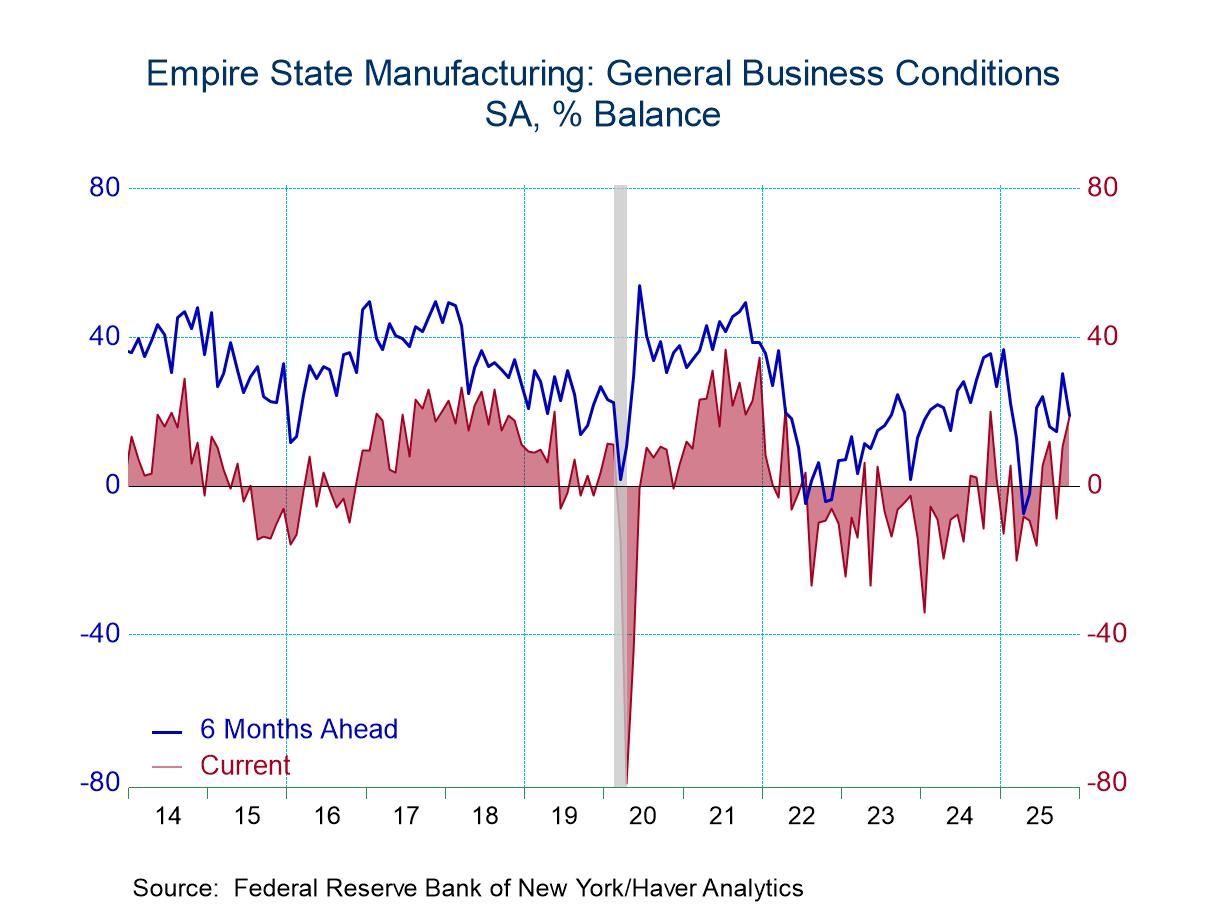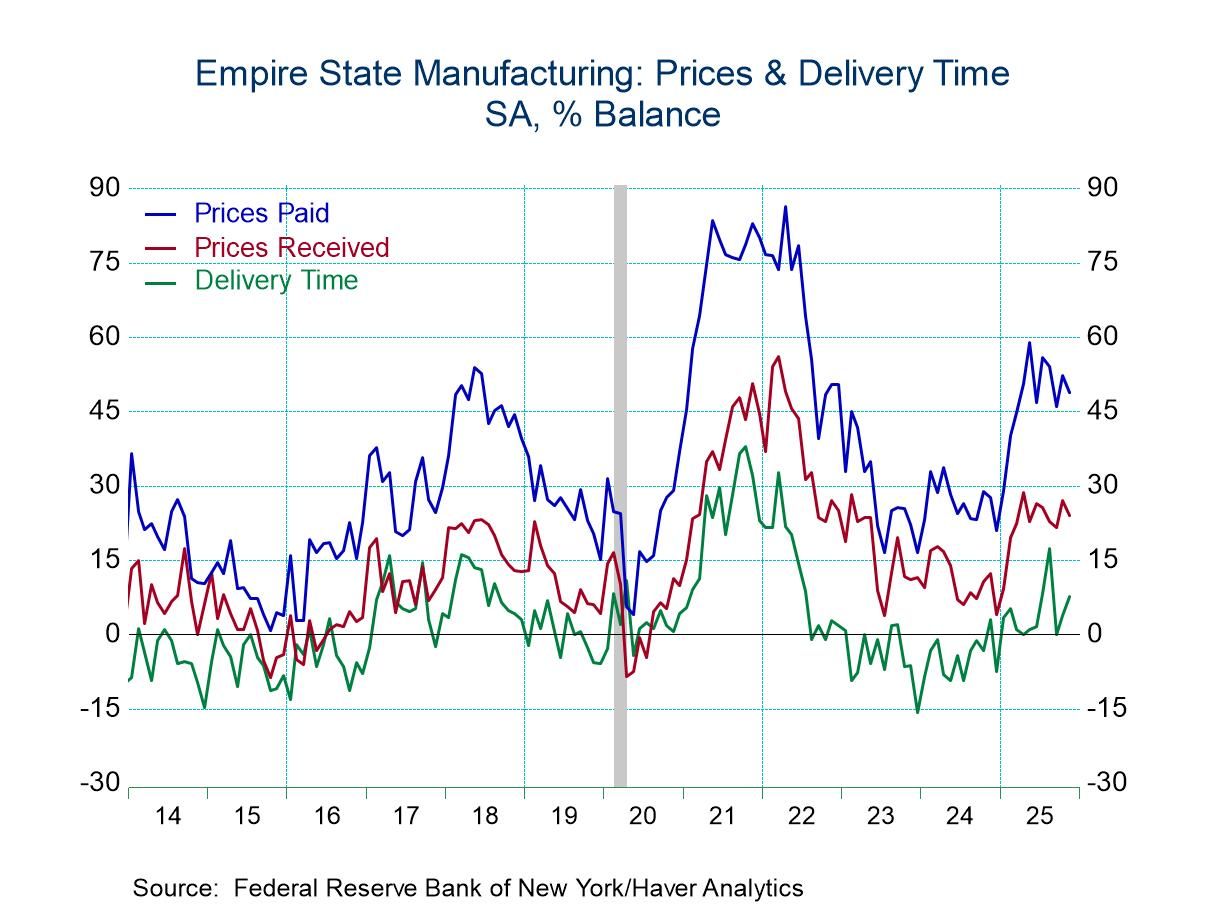Empire State Manufacturing Index Continues to Strengthen in November
by:Tom Moeller
|in:Economy in Brief
Summary
- New orders, shipments, employment & hours rise.
- Prices paid & received decline.
- Six-month outlook deteriorates.


The Empire State Manufacturing Index of General Business Conditions Index increased to 18.7 in November after rising to 10.7 in October and falling to -8.7 during September, according to the Empire State Manufacturing Survey released by the Federal Reserve Bank of New York. The latest was the highest reading in twelve months, holding above the break-even level of zero for four of the past five months. The Action Economics Forecast Survey expected a reading of 6.0 for November. The percentage of respondents reporting an increase in general business conditions rose to 38.7% in November after increasing to 36.6% in October. The percentage reporting a decline in activity fell to 20.0% after weakening to 26.0% in October. The latest survey was conducted between November 3 and November 10. The headline reflects the answer to a single question concerning the state of economic activity and is not calculated from the components.
Haver Analytics calculates a composite index from the five major components, which is comparable to the ISM manufacturing index. It rose to a nearly three-year high of 55.4 from 52.7 in October. The index is an average of five diffusion indexes: new orders, shipments, employment, supplier deliveries and inventories, each with equal weights of 20% each.
The increase in the Empire State readings this month was paced by a surge in the new orders index to 15.9 from 3.7 in October. A higher thirty-eight percent of respondents reported an increase in order, while the percentage reporting a decline in orders fell to 22.1%. The shipments index strengthened to 16.8, a twelve month-high. Inventories jumped to 6.7 after three straight negative readings. The delivery times measure increased to 7.7 from 3.9. On the labor front, the employment reading strengthened to 6.6, a four-month high. Fourteen percent of survey respondents reported higher employment while 7.2% reported less. The average workweek reading surged to 7.7, after two straight negative readings, climbing to the highest level since May 2022. Moving lower, the unfilled orders index in November fell to -5.8, after improving to -3.9 in October.
Inflation readings weakened in November. The prices paid index fell to 49.0 after rising to 52.4 in October. A lessened 51.9% of respondents reported higher prices while an increased 2.9% indicated a decline. The prices received index eased to 24.0 after rising to 27.2 October. Both prices paid & prices received indexes, however, remain significantly higher than early last year.
Optimism amongst survey respondents about business during the next six months weakened in November. The index for future general business conditions fell to 19.1 from 30.3 in October. Expected new orders, shipments, unfilled orders and delivery time declined. The future workweek reading also declined but the expected employment reading rose to the highest level since January. The future prices paid declined after rising to the highest level since May while prices received in six months fell to a three-month low. The expected capital spending plans reading surged this month to the highest level since January.
The indexes in this report are diffusion indexes and measure the percentage of respondents indicating an increase minus the percentage indicating a decrease with zero separating expansion from contraction.
The New York Fed survey data are contained in Haver’s SURVEYS database. The expectations series is in Haver’s AS1REPNA database.


Tom Moeller
AuthorMore in Author Profile »Prior to joining Haver Analytics in 2000, Mr. Moeller worked as the Economist at Chancellor Capital Management from 1985 to 1999. There, he developed comprehensive economic forecasts and interpreted economic data for equity and fixed income portfolio managers. Also at Chancellor, Mr. Moeller worked as an equity analyst and was responsible for researching and rating companies in the economically sensitive automobile and housing industries for investment in Chancellor’s equity portfolio. Prior to joining Chancellor, Mr. Moeller was an Economist at Citibank from 1979 to 1984. He also analyzed pricing behavior in the metals industry for the Council on Wage and Price Stability in Washington, D.C. In 1999, Mr. Moeller received the award for most accurate forecast from the Forecasters' Club of New York. From 1990 to 1992 he was President of the New York Association for Business Economists. Mr. Moeller earned an M.B.A. in Finance from Fordham University, where he graduated in 1987. He holds a Bachelor of Arts in Economics from George Washington University.
More Economy in Brief
 Global| Feb 05 2026
Global| Feb 05 2026Charts of the Week: Balanced Policy, Resilient Data and AI Narratives
by:Andrew Cates






